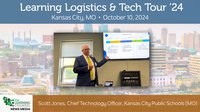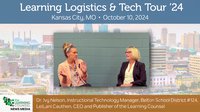“With an estimated 50% of students nationwide using some sort of computing device for a significant portion of the school day, more and more schools throughout the nation are using all-digital curriculum and content, but some schools are proving themselves to be head and shoulders above the rest,” said Leilani Cauthen, founder and CEO of the Learning Counsel.
The organization presented its Award of Excellence for Digital Curriculum & Content Strategy at the annual national conference for education executives at a special ceremony, sponsored by T-Mobile, on November 3.
Following are the honorees and what they have done at their schools and districts:
Grand Winner: Denver Public Schools
Denver Public Schools (DPS) has created a vision for integrating and using digital curriculum and content into the teaching and learning process at each of its 185 schools. The Denver 2020 plan outlines the use of technology as a key strategy to ensure a high quality learning experience for its students. This strategy allows the district to leverage the curriculum content and data to create highly personalized learning for each of its 87,000 students.
Urban Districts
1st Place: Houston Independent School District (Texas)
As the eighth largest school district in the U.S., serving approximately 214,000 students, Houston ISD has made tremendous strides in the last two years, implementing its 1:1 “PowerUp” initiative in its high schools. This initiative defines and shapes a plan for personalized learning and a digital transformation that puts computers in the hands of every student beginning in high school, ultimately eliminating print resources for the district’s high schools.
“Not only is HISD being an aggressive leader in using digital curriculum and content, its leaders are playing key roles in national discussions pushing for the adoption of format standards. Their leadership is sparking much discussion around the portability of content in order to allow flexibility in use,” said Cauthen.

(From L-R) David Bezzant, Senior National Director – Government Mobility Solutions, T-Mobile; Leng Fritsch, Assistant Superintendent; Anne Boothe, Director – Academic Services & Personalized Learning; and Christina Masick, IT General Manager of Houston Independent School District.
Suburban School Districts
1st Place: Union County Public Schools, North Carolina
Union County Public Schools has the largest 1:1 digital learning program in North Carolina with over 24,000 Chromebooks being used by students in grades 6 to 12. Union County’s digital learning initiative, called “My Size Fits All”, focuses on teachers’ professional development to provide students with a more personalized learning experience to increase student motivation. The initiative’s focus on instruction and student engagement has yielded one of North Carolina’s highest cohort graduation rates, exceeding 93% in the 2013-14 school year.

(From L-R) Tony Burrus, Chief Technology Officer, Dr. Mike Webb, Deputy Superintendent, and Superintendent Mary Ellis of Union County Public Schools (Monroe, NC) with David Bezzant, Senior National Director – Government Mobility Solutions, of T-Mobile.
2nd Place: Township High School District 214, Illinois
Township High School District has developed a true model curriculum adoption process that has prioritized digital curriculum and content. The district, located in Arlington Heights, just outside of Chicago, serves approximately 12,000 high school students and uses a 1:1 tablet initiative that has increased student performance over the past 4 years. Township’s strong professional development program has played a critical role in its faculty’s enthusiasm for and high adoption of digital curriculum and content.

(From L-R) Dr. David Kafitz, Vice President of School Relations, of The Learning Counsel; Rudy Gomez, District Technology Services Supervisor and Matt Hamilton, Innovative Technology Facilitator of Township High School District and David Bezzant, Senior National Director – Government Mobility Solutions of T-Mobile
3rd Place: Katy Independent School District, Texas
Katy Independent School District, located just outside Houston, has been using digital devices in its schools for the past six years with a focus on ensuring equity and access for all students and providing a teaching and learning model that strives to increase student motivation, intervene with struggling students and increase personalized learning opportunities for students. The district operates a device-lending program that provides devices for students unable to bring their own device to school. This is essential in a district that is growing at a rate of about 3,000 students per year. Students from kindergarten through grade 12 have access to a variety of digital curriculum and content. In addition, about 75% of teachers use digital curriculum and content in their teaching with an aim toward fulfilling the district’s teaching and learning goals.

(From L-R) John Alawneh, Chief Information Officer, Darlene Rankin, Director – Instructional Technology, Jamey Hynds, Director – Business Intelligence, Joe Christofferson, Director – Technology Operations , Brenda White, Director – Project Manager, Kerry Rampelli, Director – Enterprise Systems, and Fran McTigrit, Director – Customer Services of Katy ISD and David Bezzant, Senior National Director – Government Mobility Solutions of T-Mobile
Rural School Districts
1st Place - Carlton Independent School District, Minnesota
Carlton Independent School District, in rural Minnesota, is providing an atmosphere of innovation despite the economy of scale issues that constrain small rural school systems. District leaders in this district of just under 500 students have taken the lead to build a transition to digital device use by its students and teachers with a Bring Your Own Device program, institutional changes to best utilize digital curriculum and content and assessing instruction to ensure a strong pedagogical system of district instruction.

(From L-R) Dr. David Kafitz, Vice President of School Relations of The Learning Counsel; Carlton ISD Supt. Peter Haapala, and David Bezzant, Senior National Director – Government Mobility Solutions of T-Mobile
2nd Place - Center Independent School District, Texas (NO PHOTO)
Center Independent School District is in its second year of a 1:1 initiative that provides a tablet device to students in grades 6 to 10 and allows students in grades 4 to 12 to bring their own device to school. The district, located in Shelby County, TX, along the Louisiana border, is transitioning to digital curriculum and content and leveraging video conferencing technology to provide connectivity between multiple sites and to stream content to its students’ and teachers’ mobile devices.
Special Recognition:
Alabama Department of Education’s Learning Exchange Program
The Alabama Learning Exchange (ALEX) is a one-stop resource for educators, parents and students that indexes and shares dozens of types of educational materials and information. The ALEX website saves already limited educational funds and provides more than 65,000 links to the highest quality digital learning resources to truly ignite learning. ALEX receives, on average, over 100,000 unique visitors per month from all over the U.S. and the world, making it a leading educational web portal. With a focus on global preparedness, students, educators, and parents can engage with interactive resources, podcasts, games, teaching strategies, and blue ribbon lesson plans, all linked to Common Core Standards. “The ALEX team at the Alabama Department of Education has done outstanding work to provide curated, high-quality learning resources to Alabama and organizations and individuals around the U.S. and the world,” said LeiLani Cauthen, founder and CEO of the Learning Counsel. “Their work is truly commendable.”

(From L-R) David Bezzant, Senior National Director – Government Mobility Solutions of T-Mobile, Dr. Richard Murphy, Technology Innovation Specialist of Alabama Learning Exchange and Dr. David Kafitz, Vice President of School Relations











